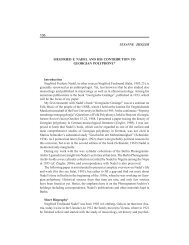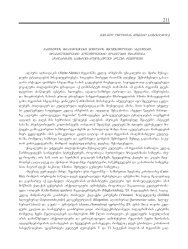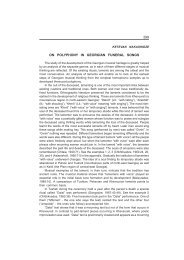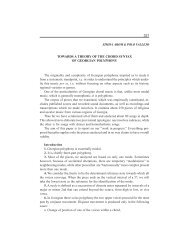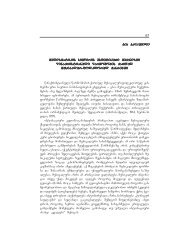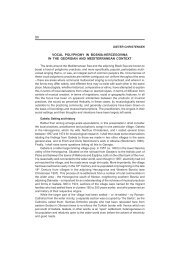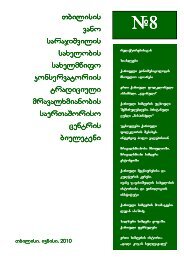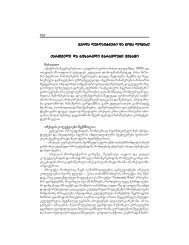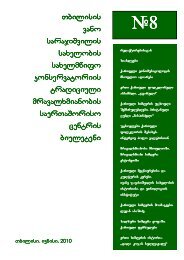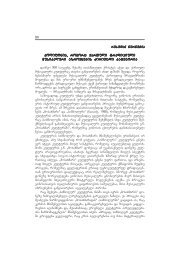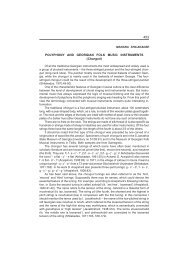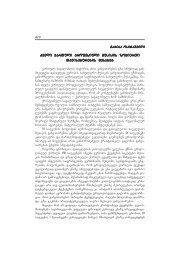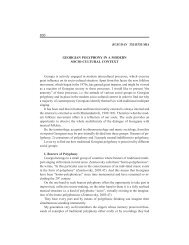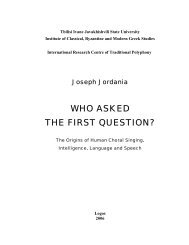- Page 1 and 2:
m o x s e n e b e b i 4-8 oqtomberi
- Page 3 and 4:
s a r C e v i redaqtorebisagan ....
- Page 5 and 6:
franc foedermairi (avstria) megruli
- Page 7 and 8:
Davit Shughliashvili (Georgia) “W
- Page 9 and 10:
edaqtorebisagan winamdebare krebulS
- Page 11 and 12:
edaqtorebisagan koleqcias. moxseneb
- Page 13 and 14:
From The Editors G
- Page 15:
aziuri tradiciuli polifonia ASIAN T
- Page 18 and 19:
18 ioseb Jordania anobis arsebuli t
- Page 20 and 21:
20 ioseb Jordania mkvlevarebis yura
- Page 22 and 23:
22 ioseb Jordania xmianobasTan da T
- Page 24 and 25:
24 TRADITIONAL POLYPHONY IN ASIA: P
- Page 26 and 27:
26 Joseph Jordania scholar Schehera
- Page 28 and 29:
28 Joseph Jordania 2. Asian polypho
- Page 30 and 31:
30 Joseph Jordania gestion not only
- Page 32 and 33:
32 virtualuri heterofonia: kompozic
- Page 34 and 35:
34 munir nuretin bekeni (aSS) migvi
- Page 36 and 37:
36 MÜNIR NURETTIN BEKEN (USA) VIRT
- Page 38 and 39:
38 Münir Nurettin Beken This becam
- Page 40 and 41:
40 munir nuretin bekeni. danarTi M
- Page 42 and 43:
42 nino ciciSvili (avstralia, saqar
- Page 44 and 45: 44 nino ciciSvili (2) reCitaciuli b
- Page 46 and 47: 46 nino ciciSvili upirveles yovlisa
- Page 48 and 49: 48 nino ciciSvili kulturis arsebobi
- Page 50 and 51: 50 NINO TSITSISHVILI (AUSTRALIA, GE
- Page 52 and 53: 52 Nino Tsitsishvili Factor 3: scal
- Page 54 and 55: 54 Nino Tsitsishvili A historical i
- Page 56 and 57: 56 Nino Tsitsishvili References Ale
- Page 58 and 59: 58 kunZul balis gamelanis musikis p
- Page 60 and 61: 60 maikl tenzeri saciis xangrZliobi
- Page 62 and 63: 62 maikl tenzeri arsebobas, Sreebs
- Page 64 and 65: 64 Michael Tenzer repeats cyclicall
- Page 66 and 67: 66 Michael Tenzer pulsations serves
- Page 68 and 69: 68 maikl tenzeri. danarTi Michael T
- Page 70 and 71: 70 magaliTi 4. bgeris simaRlis, dro
- Page 72 and 73: 72 iu-siu lu Tsou (Tsou) 6 733 seis
- Page 74 and 75: 74 iu-siu lu sawyis etapze taivanel
- Page 76 and 77: 76 iu-siu lu 4 paralelur kvartebsa
- Page 78 and 79: 78 Yu-Hsiu Lu in Taiwanese aborigin
- Page 80 and 81: 80 Yu-Hsiu Lu earliest tribes in th
- Page 82 and 83: 82 iu-siu lu. danarTi Yu-Hsiu Lu. A
- Page 84 and 85: 84 marina qavTaraZe, ekaterine buCu
- Page 86 and 87: 86 marina qavTaraZe, ekaterine buCu
- Page 88 and 89: 88 marina qavTaraZe, ekaterine buCu
- Page 90 and 91: 90 marina qavTaraZe, ekaterine buCu
- Page 92 and 93: 92 Marina Kavtaradze, Ekaterine Buc
- Page 96 and 97: 96 Marina Kavtaradze, Ekaterine Buc
- Page 98 and 99: 98 rie koCi akompanementiT, instrum
- Page 100 and 101: 100 cxr. 3 rie koCi 1) kanonuri uko
- Page 102 and 103: 102 rie koCi rasac mReroda wamyvani
- Page 104 and 105: 104 ON THE POLYPHONIC SINGING STYLE
- Page 106 and 107: 106 singing the same melody followi
- Page 108 and 109: 108 Rie Kôchi 3. Recent movements
- Page 110 and 111: 110 Rie Kôchi Kôchi, Rie. (ed.).
- Page 112 and 113: 112 rie koCi. danarTi Rie Kôchi. A
- Page 115 and 116: 115 ala sokolova (adiRe, ruseTi) ad
- Page 117 and 118: adiReas tradiciuli kulturis ameburi
- Page 119 and 120: adiReas tradiciuli kulturis ameburi
- Page 121 and 122: adiReas tradiciuli kulturis ameburi
- Page 123 and 124: 123 ALLA SOKOLOVA (RUSSIA, REPUBLIC
- Page 125 and 126: The Meanings and C
- Page 127 and 128: The Meanings and C
- Page 129 and 130: The Meanings and C
- Page 131 and 132: ala sokolova. danarTi Alla Sokolova
- Page 133 and 134: 133 natalia zumbaZe, qeTevan maTiaS
- Page 135 and 136: kavkasiel xalxTa mravalxmianoba da
- Page 137 and 138: kavkasiel xalxTa mravalxmianoba da
- Page 139 and 140: kavkasiel xalxTa mravalxmianoba da
- Page 141 and 142: kavkasiel xalxTa mravalxmianoba da
- Page 143 and 144: 143 NATALIA ZUMBADZE, KETEVAN MATIA
- Page 145 and 146:
Caucasian Peoples’ Polyphony and
- Page 147 and 148:
Caucasian Peoples’ Polyphony and
- Page 149 and 150:
Caucasian Peoples’ Polyphony and
- Page 151 and 152:
Caucasian Peoples’ Polyphony and
- Page 153 and 154:
natalia zumbaZe, qeTevan maTiaSvili
- Page 155 and 156:
155 maia gelaSvili (saqarTvelo) pan
- Page 157 and 158:
pankisis xeobis qistebis tradiciuli
- Page 159 and 160:
ON THE STUDY OF THE TRADITIONAL MUS
- Page 161 and 162:
On the Study of the Traditional Mus
- Page 163 and 164:
163 maka xarZiani (saqarTvelo) samx
- Page 165 and 166:
samxmiani simRerebis gaerTxmianebis
- Page 167 and 168:
samxmiani simRerebis gaerTxmianebis
- Page 169 and 170:
On the Change of Three-Part Songs i
- Page 171 and 172:
On the Change of Three-Part Songs i
- Page 173 and 174:
173 manana SilakaZe (saqarTvelo) qa
- Page 175 and 176:
qarTuli da adiReuri instrumentuli m
- Page 177 and 178:
177 MANANA SHILAKADZE (GEORGIA) GEO
- Page 179 and 180:
Georgian and Adyghe Music in the Co
- Page 181 and 182:
manana SilakaZe. danarTi Manana Shi
- Page 183:
Ktradiciuli polifoniis regionuli st
- Page 186 and 187:
186 Jana partlasi mizezis gamo. upi
- Page 188 and 189:
188 Jana partlasi naxevartoniani ki
- Page 190 and 191:
190 ŽANNA PÄRTLAS (ESTONIA) RETRA
- Page 192 and 193:
192 Žanna Pärtlas melodic lines c
- Page 194 and 195:
194 Jana partlasi. danarTi Žanna P
- Page 196 and 197:
196 damwyebi xma qarTul mravalxmian
- Page 198 and 199:
198 Tamaz gabisonia g) mxolod simRe
- Page 200 and 201:
200 Tamaz gabisonia sovs, damwyebis
- Page 202 and 203:
202 Tamaz Gabisonia of these songs
- Page 204 and 205:
204 Tamaz Gabisonia mazhogh). So do
- Page 206 and 207:
206 Tamaz gabisonia. danarTi Tamaz
- Page 208 and 209:
208 Tamaz gabisonia. danarTi Tamaz
- Page 210 and 211:
210 Tamaz gabisonia. danarTi Tamaz
- Page 212 and 213:
212 gerald florian mesneri mosaxldn
- Page 214 and 215:
214 gerald florian mesneri lebi da
- Page 216 and 217:
216 GERALD FLORIAN MESSNER (AUSTRAL
- Page 218 and 219:
218 Gerald Florian Messner gives us
- Page 220 and 221:
220 Gerald Florian Messner Audio Ex
- Page 222 and 223:
222 daviT SuRliaSvili rac Seexeba a
- Page 224 and 225:
224 daviT SuRliaSvili tradicia, rom
- Page 226 and 227:
226 daviT SuRliaSvili damowmebuli l
- Page 228 and 229:
228 Davit Shughliashvili characteri
- Page 230 and 231:
230 Davit Shughliashvili the bell),
- Page 232 and 233:
232 daviT SuRliaSvili. danarTi Davi
- Page 234 and 235:
234 daviT SuRliaSvili. danarTi Davi
- Page 236 and 237:
236 elena iovanoviCi (serbeTi) hibr
- Page 238 and 239:
238 elena iovanoviCi rebiT, sakvlev
- Page 240 and 241:
240 elena iovanoviCi lis `damuqeba~
- Page 242 and 243:
242 JELENA JOVANOVIĆ (SERBIA) HYBR
- Page 244 and 245:
244 Jelena Jovanović (Dević, 1979
- Page 246 and 247:
246 Jelena Jovanović of the new st
- Page 248 and 249:
248 Jelena Jovanović Scope of Ethn
- Page 250 and 251:
250 elena iovanoviCi. danarTi Jelen
- Page 252 and 253:
252 elena iovanoviCi. danarTi Jelen
- Page 254 and 255:
254 liTSi aris SemTxveviTi modulaci
- Page 256 and 257:
256 simha aromi, polo valeho mimdev
- Page 258 and 259:
258 92 simha aromi, polo valeho ara
- Page 260 and 261:
260 axla ganvixiloT G kilos sxvadas
- Page 262 and 263:
262 simha aromi, polo valeho gadaxr
- Page 264 and 265:
264 simha aromi, polo valeho Semdeg
- Page 266 and 267:
266 OUTLINE OF A SYNTAX OF CHORDS I
- Page 268 and 269:
268 Simha Arom, Polo Vallejo 51 Mag
- Page 270 and 271:
270 Simha Arom, Polo Vallejo Betwee
- Page 272 and 273:
272 Simha Arom, Polo Vallejo 5 II I
- Page 274 and 275:
274 Simha Arom, Polo Vallejo 88 Ere
- Page 276 and 277:
276 Simha Arom, Polo Vallejo Let us
- Page 278 and 279:
278 andrea kuzmiCi (kanada) qarTuli
- Page 280 and 281:
280 andrea kuzmiCi musikologia da T
- Page 282 and 283:
282 andrea kuzmiCi da profesiuls 3
- Page 284 and 285:
284 ANDREA KUZMICH (CANADA) THE TRA
- Page 286 and 287:
286 Andrea Kuzmich traditional musi
- Page 288 and 289:
288 Andrea Kuzmich the ability to l
- Page 290 and 291:
290 daiva raCiunaite-viCiniene (lit
- Page 292 and 293:
292 daiva raCiunaite-viCiniene Sin
- Page 294 and 295:
294 daiva raCiunaite-viCiniene litv
- Page 296 and 297:
296 daiva raCiunaite-viCiniene / su
- Page 298 and 299:
298 daiva raCiunaite-viCiniene nebi
- Page 300 and 301:
300 daiva raCiunaite-viCiniene buli
- Page 302 and 303:
302 daiva raCiunaite-viCiniene wreS
- Page 304 and 305:
304 (Stasys Paliulis) mier 1932 wel
- Page 306 and 307:
306 LITHUANIAN AND AINU VOCAL POLYP
- Page 308 and 309:
308 Daiva Račiūnaitė -Vyčinien
- Page 310 and 311:
310 Daiva Račiūnaitė -Vyčinien
- Page 312 and 313:
312 Daiva Račiūnaitė -Vyčinien
- Page 314 and 315:
314 Daiva Račiūnaitė -Vyčinien
- Page 316 and 317:
316 Daiva Račiūnaitė -Vyčinien
- Page 318 and 319:
318 10 C. Forlivesi assumes that mu
- Page 320 and 321:
320 Daiva Račiūnaitė -Vyčinien
- Page 322 and 323:
322 daiva raCiunaite-viCiniene. dan
- Page 324 and 325:
324 daiva raCiunaite-viCiniene. dan
- Page 326 and 327:
326 daiva raCiunaite-viCiniene. dan
- Page 328 and 329:
328 daiva raCiunaite-viCiniene. dan
- Page 330 and 331:
330 daiva raCiunaite-viCiniene. dan
- Page 332 and 333:
332 daiva raCiunaite-viCiniene. dan
- Page 334 and 335:
334 mixail lobanovi eTnografiisadmi
- Page 336 and 337:
336 mixail lobanovi yoveli maTgani
- Page 338 and 339:
338 vielebTan, aramed Crdilo-evropu
- Page 340 and 341:
340 Mikhail Lobanov Konz mäthil Gr
- Page 342 and 343:
342 Mikhail Lobanov due to the lowe
- Page 344 and 345:
344 Mikhail Lobanov Kravchinskaia,
- Page 346 and 347:
346 mixail lobanovi. danrTi Mikhail
- Page 348 and 349:
348 mixail lobanovi. danrTi Mikhail
- Page 350 and 351:
350 ana piotrovska ungreTSi boSa mu
- Page 352 and 353:
352 ana piotrovska tradicia grZelde
- Page 354 and 355:
354 ana piotrovska iseT istoriul mi
- Page 356 and 357:
356 THE NOTION OF SO CALLED GYPSY M
- Page 358 and 359:
358 Anna Piotrowska be claimed that
- Page 360 and 361:
360 Anna Piotrowska Consequently im
- Page 362 and 363:
362 Anna Piotrowska Nettl, Bruno. (
- Page 364 and 365:
364 nino razmaZe indi mindi da sxv.
- Page 366 and 367:
366 nino razmaZe qme. (2) Sesrulebi
- Page 368 and 369:
368 THE DYNAMICS OF THE EVOLUTION O
- Page 370 and 371:
370 Nino Razmadze was always perfor
- Page 372 and 373:
372 nino razmaZe. danarTi Nino Razm
- Page 374 and 375:
374 magaliTi 4. oTxxmianoba patara
- Page 377 and 378:
377 ekaterine oniani (saqarTvelo) q
- Page 379 and 380:
qarTuli galobis mravalxmianobis sak
- Page 381 and 382:
ON THE POLYPHONY OF GEORGIAN CHANT
- Page 383 and 384:
On the Polyphony of Georgian Chant
- Page 385 and 386:
ekaterine oniani. danarTi Ekaterine
- Page 387 and 388:
387 jeremi fauci (aSS) siZvele da t
- Page 389 and 390:
siZvele da tradiciuloba qarTul trad
- Page 391 and 392:
siZvele da tradiciuloba qarTul trad
- Page 393 and 394:
siZvele da tradiciuloba qarTul trad
- Page 395 and 396:
Ancientness and Traditionality in G
- Page 397 and 398:
Ancientness and Traditionality in G
- Page 399 and 400:
Ancientness and Traditionality in G
- Page 401 and 402:
401 svimon (jiqi) jangulaSvili (saq
- Page 403 and 404:
mravalxmiani musikaluri qsovilis tr
- Page 405 and 406:
mravalxmiani musikaluri qsovilis tr
- Page 407 and 408:
mravalxmiani musikaluri qsovilis tr
- Page 409 and 410:
SPECIFIC FEATURES OF THE POLYPHONIC
- Page 411 and 412:
Specific Features of the Polyphonic
- Page 413 and 414:
Specific Features of the Polyphonic
- Page 415 and 416:
Specific Features of the Polyphonic
- Page 417 and 418:
svimon (jiqi) jangulaSvili. danarTi
- Page 419 and 420:
svimon (jiqi) jangulaSvili. danarTi
- Page 421 and 422:
svimon (jiqi) jangulaSvili. danarTi
- Page 423 and 424:
svimon (jiqi) jangulaSvili. danarTi
- Page 425 and 426:
ivliane nikolaZe: qarTul ZlispirTa
- Page 427 and 428:
ivliane nikolaZe: qarTul ZlispirTa
- Page 429 and 430:
ivliane nikolaZe: qarTul ZlispirTa
- Page 431 and 432:
ivliane nikolaZe: qarTul ZlispirTa
- Page 433 and 434:
Ivliane Nikoladze: The</str
- Page 435 and 436:
Ivliane Nikoladze: The</str
- Page 437 and 438:
Ivliane Nikoladze: The</str
- Page 439 and 440:
jon a. gremi. danarTi John A. Graha
- Page 441 and 442:
jon a. gremi. danarTi John A. Graha
- Page 443 and 444:
jon a. gremi. danarTi John A. Graha
- Page 445 and 446:
jon a. gremi. danarTi John A. Graha
- Page 447 and 448:
M 447 ekaterine diasamiZe (saqarTve
- Page 449 and 450:
mravalxmianobis formebi rusul saekl
- Page 451 and 452:
mravalxmianobis formebi rusul saekl
- Page 453 and 454:
Polyphonic Forms in 17th century Ru
- Page 455 and 456:
Polyphonic Forms in 17th century Ru
- Page 457 and 458:
ekaterine diasamiZe. danarTi Ekater
- Page 459 and 460:
459 baia JuJunaZe (saqarTvelo) XIX
- Page 461 and 462:
XIX saukunis qarTuli samgaloblo tra
- Page 463 and 464:
XIX saukunis qarTuli samgaloblo tra
- Page 465 and 466:
New Tendencies in the Nineteenth-Ce
- Page 467 and 468:
New Tendencies in the Nineteenth-Ce
- Page 469 and 470:
aia JuJunaZe. danarTi Baia Zhuzhuna
- Page 471 and 472:
aia JuJunaZe. danarTi Baia Zhuzhuna
- Page 473 and 474:
gamSvenebaTa struqturuli formulebi
- Page 475 and 476:
ORNAMENTED STRUCTURAL FORMULAS IN T
- Page 477 and 478:
Ornamented Structural Formulas in t
- Page 479 and 480:
nino naneiSvili. danarTi Nino Nanei
- Page 481:
nino naneiSvili. danarTi Nino Nanei
- Page 485 and 486:
485 gerda lexlaitneri (avstria) non
- Page 487 and 488:
zogierTi mosazreba mravalxmiani mus
- Page 489 and 490:
zogierTi mosazreba mravalxmiani mus
- Page 491 and 492:
zogierTi mosazreba mravalxmiani mus
- Page 493 and 494:
Some Considerations on the Interpre
- Page 495 and 496:
Some Considerations on the Interpre
- Page 497 and 498:
Some Considerations on the Interpre
- Page 499 and 500:
gerda lexlaitneri, nona lomiZe. dan
- Page 501 and 502:
gerda lexlaitneri, nona lomiZe. dan
- Page 503 and 504:
503 franc foedermairi (avstria) meg
- Page 505 and 506:
megruli simReris sami Sedevri, Cawe
- Page 507 and 508:
Three Masterpieces of Megrelian Son
- Page 509 and 510:
franc foedermairi. danarTi Franz F
- Page 511 and 512:
franc foedermairi. danarTi Franz F
- Page 513:
franc foedermairi. danarTi Franz F
- Page 517 and 518:
517 morimoto masako, honda manabu,
- Page 519 and 520:
qarTuli tradiciuli mravalxmianobis
- Page 521 and 522:
521 MORIMOTO MASAKO, HONDA MANABU,
- Page 523 and 524:
Study on the Sound Structure of Geo
- Page 525 and 526:
morimoto masako, honda manabu, niSi
- Page 527 and 528:
527 kavai norie, morimoto masako, h
- Page 529 and 530:
qarTuli tradiciuli mravalxmianobis
- Page 531 and 532:
qarTuli tradiciuli mravalxmianobis
- Page 533 and 534:
Study on the Sound Structure of Geo
- Page 535 and 536:
Study on the Sound Structure of Geo
- Page 537 and 538:
kavai norie, morimoto masako, honda
- Page 539 and 540:
kaxuri simRerebis gaSifvris sakiTxe
- Page 541 and 542:
CHALLENGES IN MUSICAL TRANSCRIPTION
- Page 543 and 544:
nona lomiZe. danarTi Nona Lomidze.
- Page 545 and 546:
nona lomiZe. danarTi Nona Lomidze.
- Page 547 and 548:
nona lomiZe. danarTi Nona Lomidze.
- Page 549 and 550:
nona lomiZe. danarTi Nona Lomidze.
- Page 551:
nona lomiZe. danarTi Nona Lomidze.
- Page 555 and 556:
555 leila maruaSvili (saqarTvelo) q
- Page 557 and 558:
qarTuli xalxuri polifoniis tradicie
- Page 559 and 560:
qarTuli xalxuri polifoniis tradicie
- Page 561 and 562:
qarTuli xalxuri polifoniis tradicie
- Page 563 and 564:
Refraction of Georgian Folk Polypho
- Page 565 and 566:
Refraction of Georgian Folk Polypho
- Page 567 and 568:
Refraction of Georgian Folk Polypho
- Page 569 and 570:
leila maruaSvili. danarTi Leila Mar
- Page 571 and 572:
leila maruaSvili. danarTi Leila Mar
- Page 573 and 574:
ioseb Jordania, xelovnebaTmcodneobi
- Page 575 and 576:
polo valeho, eTnomusikologiis doqto
- Page 578 and 579:
578 simpoziumis organizatorebi mxar



